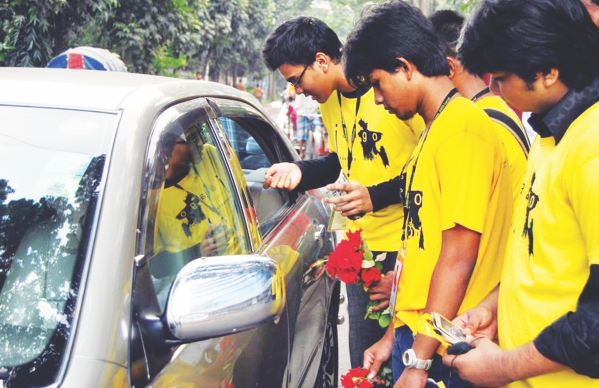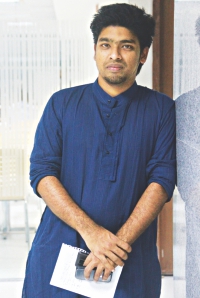Universal Children's Day

COURTESY: JAAGO FOUNDATION
Painting the Streets Yellow, Again!
Elita Karim
One of the many new ideas that 'rocked' Dhaka city and also many areas outside the capital is the emergence of young people willing to step up and voice out -- against poverty, corruption, for all the wrongs that they see around them. Of course, Wrongs have always been made right in this country, as history confirms, where the older generation has always guided the young. However, the last decade has witnessed an upsurge of young minds and souls, who made it a point to get into action and make their dreams come true, for a better Bangladesh.
One such youth, who we hear about a lot these days, is Korvi Rakhshand, the founder of Jaago Foundation, a school for slum children. This year, for the fourth year in a row, Korvi and his team will be celebrating Universal Children's Day with the rest of the country. For the last three years, volunteers have been hitting the streets, handing out flowers to people waiting in the red light and accepting donations. "Last year, we collected around 25 lakh takas with over 7,000 volunteers, working all over the country," says Korvi. "This year we have around 10,000 volunteers and they will be working in 21 districts."
| |
 |
| |
Photo: Kazi Tahsin Agaz Apurbo |
The money they collect will go towards the education of the children who study in the Jaago schools in Dhaka (RayerBazaar slum, Banani Karal slum and Gazipur) and Chittagong. "The school in Gazipur is actually an online school," explains Korvi. "Unfortunately, we could not find proper teachers in that area, which is why we developed the online school, operating through skype. Teachers in Rayerbazaar connect with the children in Gazipur via skype. Its working very well and we hope to develop this technology further."
Universal Chidren's Day or UCD is actually celebrated on November 20, all over the world. "But this year, we plan to celebrate it on November 15," explains Korvi. "Like every year, we will invite the street children, in all the 21 districts, for a day out with music, food and amusement. Since the park Wonderland has been demolished, we will be organising this event on Banani field."
Korvi explains that children in fact are to enjoy certain rights, which they unfortunately can't in Bangladesh. "The right to education, shelter, food and health," says Korvi. "We, however, also emphasise on a fifth right on UCD -- the right to smile!"
While the street children take a break from selling their flowers, popcorn and other tit bits to people waiting in the traffic, the 10,000 young Jaago volunteers will take over and collect funds. "Last year, we had faced some problems with the volunteers," admits Korvi. "A lot from the funds collected by the volunteers were misused and not delivered to us. I believe it is because last year, some of the volunteers were probably not convinced enough about the job they had to undertake, which is why they did not do it with honesty. We had started an online registration last year through which thousands of young people became volunteers with a single click sitting at home. In fact, some of them also did not attend the mandatory workshops, before hitting the streets. This year, we have changed all that. Interested young people had to come all the way to the Rayerbazaar slums to register, since the online registration has been shut down. Everyone has to attend the workshops, no matter who they are. The whole process will be monitored by us through out the day."
Korvi also mentions that this year, the people giving the donation money to the volunteers will be given a receipt. "The amount will be printed on our auto-carbon papers," says Korvi. "This way, we will be able to keep track of the money being donated to the volunteers."
Like every year, this year also the day long event will end with musical performances by famous names at the Banani field.
Please collect your receipt upon payment of the donation money to the Jaago volunteers on November 15.
DID YOU KNOW?
Jawaharlal Nehru
Jawaharlal Nehru was born on November 14, 1889, in Allahabad in British India. Nehru described his childhood as a "sheltered and uneventful one." He grew up in an atmosphere of privilege at wealthy homes including a large palatial estate called the Anand Bhawan. His father had him educated at home by private governesses and tutors. Under the influence of a tutor, Ferdinand T Brooks, Nehru became interested in science and theosophy. Nehru was subsequently initiated into the Theosophical Society at age thirteen by family friend Annie Beasant. However, his interest in theosophy did not prove to be enduring and he left the society shortly afterwards Brooks departed as his tutor. Nehru became an ardent nationalist during his youth. The Boer War and the Russo-Japanese War intensified his feelings. Nehru went to Trinity College, Cambridge in October 1907 and graduated with an honours degree in natural science in 1910. During this period, Nehru also studied politics, economics, history and literature desultorily. Writings of Bernard Shaw, H.G Wells, J M Keynes, Bertrand Russell, Lowes Dickinson and Meredith Townsend moulded much of his political and economic thinking. After completing his degree in 1910, Nehru went to London and stayed there for two years for law studies at the Inns of Court School of Law (Inner Temple). During this time, he continued to study the scholars of the Fabian Society including Beatrice Webb. Nehru passed his bar examinations in 1912 and was admitted to the English bar.
Information Source: Internet
|
|
|
